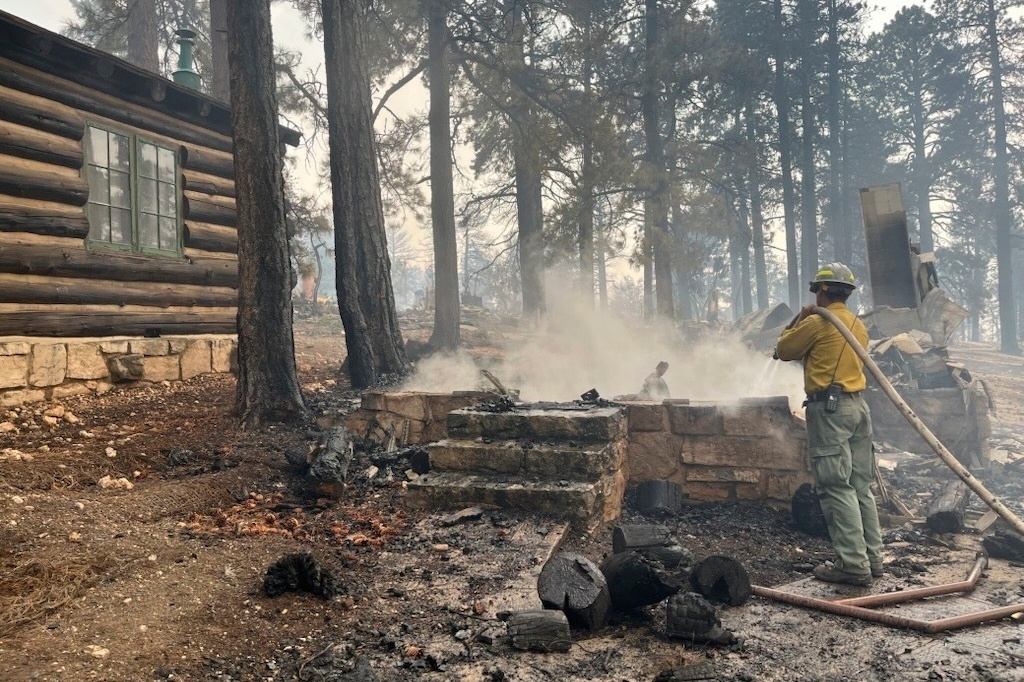
El Paso County law-enforcement leaders on Thursday defended their handling of a previous incident involving the person now charged with killing five people in the shooting attack on Club Q in Colorado Springs.
The statement was a response to criticism and questions about whether the sheriff’s office could have used the state’s “red flag” law to bar the suspect, Anderson Lee Aldrich, from having guns after a previous arrest.
In 2021, the El Paso County Sheriff’s Office arrested Aldrich after Aldrich allegedly threatened to detonate a bomb and kill the suspect's own grandparents, engaged in a stand-off with police and reportedly talked about plans to become “the next mass killer.” When they arrested Aldrich, authorities confiscated guns and bomb-making materials.
Lawmakers, media and others have questioned why the sheriff’s office didn’t then file for an Extreme Risk Protection Order, which would have banned Aldrich from having or buying guns.
“There were many warning signs,” a spokesman for Gov. Jared Polis recently told the Associated Press. “It appears obvious that an Extreme Risk Protection Order law could have and should have been utilized, which would have removed the suspect’s firearms and could very well have prevented this tragedy.”
Some of the criticism focused on El Paso County law enforcement leaders’ long-standing resistance to using the red-flag law. The sheriff’s office has never filed an ERPO request, and Sheriff Bill Elder previously said he would limit his agency’s use of the new law.
Until now, many of the details of the 2021 case were unclear, since the charges had been dropped and the case records sealed earlier this year.
But with the unsealing of the records on Thursday, the El Paso County Sheriff’s office issued a lengthy statement defending its decisions about the earlier case. In the statement, the sheriff’s office blasted news outlets, politicians and others, saying that journalists hadn’t waited for the “TRUE” story and that politicians had shared “unfounded and ignorant” opinions.
Meanwhile, lawyers with expertise in ERPO said that the requirements of the law are vague and broad — leaving much of the decision-making to individual law enforcement agencies and judges.
Sheriff says ERPO was ‘redundant’ in 2021 case
A request for an ERPO can be filed either by law enforcement, relatives or household members of the person in question. It’s then considered by a judge, who has the power to revoke a person’s access to guns for two weeks, or for a longer period of up to a year.
The sheriff’s office did not initially file for an ERPO because it was “redundant and unnecessary,” the agency’s statement reads. That’s because the suspect had already been placed under a “mandatory protection order,” as a result of the arrest. The MPO, like an ERPO, bans people from possessing guns, among other provisions, according to the sheriff’s office. Elder said the authorities are still in possession of the guns seized from Aldrich at the time.
Indeed, other law enforcement agencies follow a similar policy. Several ERPO cases in Denver have been dropped because the person was already subject to another gun ban, according to court records.
But the 2021 case against the suspect was dropped this July, in part because the suspect’s family was not cooperating, according to District Attorney Michael Allen. With the case ended, the judge also dismissed the MPO, allowing the suspect to once again buy and possess guns, the sheriff’s office said.
The sheriff’s office did not file for an ERPO at that point, either. Elder argued on Wednesday that his office didn’t have that option, since a judge later sealed the case records.
“This meant that our ability to even present a factual basis for a potential ERPO request at that point was no longer available because the case in which those facts were detailed had been sealed,” the statement read.
Aldrich’s attorney moved to seal the records about two days after the case was dismissed, but the judge didn’t order the records sealed until about a month later.
ERPOs can be granted in about two weeks or less — including in El Paso County, according to court records. The sheriff’s office didn’t immediately respond to a question about whether it could have filed an ERPO in the weeks before the records were sealed.
Information was ‘too old’ by 2022
The sheriff’s office contends that, even with access to the records, it still couldn’t have filed an ERPO in the summer of 2022. The statement argues that by that point, more than a year after the original arrest, the information, “was too old to be effective in court because there was no new evidence that a threat could be articulated as existing ‘in the near future.’”
Matthew Gold, an attorney who works with clients facing ERPOs, agrees that evidence in these cases is time-sensitive, but said there’s no clear deadline in the law.
“There’s no actual time limit. However, the more time that would have passed, the harder time you would have as a petitioner to show there’s some kind of imminent threat,” said Gold, who was commenting on the law in general, and not on this specific case.
According to state law, a temporary two-week ERPO requires a preponderance of evidence that the person poses a “significant risk” in the “near future.”
A longer ban requires “clear and convincing evidence … that the respondent poses a significant risk” to themself or others, without mentioning a timeframe. The evidence that can be considered for granting an ERPO includes any “credible threat of … the unlawful or reckless use of a firearm,” along with the history of “threatened use of unlawful force,” among other options.
“The law is such an obtuse tool at times. It’s intended to give a judge discretion. The ultimate question is whether the person causes a significant risk of personal injury,” said attorney Jonathan Culwell, who also represents clients facing ERPO petitions.
He added: “It’s just really up to that judge and that jurisdiction, and the police in that jurisdiction are going to really know what’s expected in that area. … They’re looking at recency, credibility and pattern.”
The sheriff’s office contends that the case points to a problem with the law, not a mistake on its part. “The legal ability Aldrich had to acquire firearms following the dismissal of the previous case and the MPO can only be addressed legislatively,” the statement read.
Specifically, Elder said he wants the legislature to reconsider a 2019 law that makes it easier for people to seal the record of a case if the charges are dismissed. The law was passed by criminal justice reformers with the goal of preventing the life-long consequences that can spring from an arrest history.
Finally, the sheriff’s office argued that an ERPO was “not needed” because the sheriff’s office had already seized the suspect’s guns. An ERPO, however, also would have barred the suspect from future purchases.
After the case was dismissed, Aldrich attempted last summer to get back two guns — a 9 mm pistol and an assault-style rifle — along with other material confiscated by the sheriff’s office. The sheriff’s office denied that request — but it appears Aldrich went on to acquire guns anyway.
On Thursday, the governor’s office issued responded to a CPR News question about the case: “This suspect clearly was someone who, given their history from the 2021 case, should not have been in possession of firearms. The Extreme Risk Protection Order law is the easiest to invoke and most effective tool to empower family members and local law enforcement to remove existing firearms and prevent purchases of new firearms until a judge determines that the individual is no longer a threat.”
Polis would work to understand “how the system failed in this case” and how to improve it, the statement continued.









